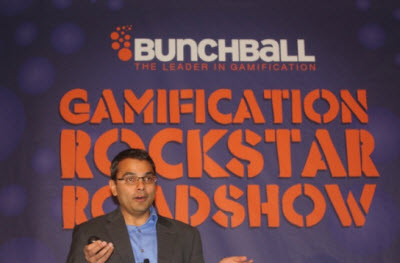GamesBeat: The gamification trend did happen, but you weren’t seriously suggesting that everybody should jump into gamification and make businesses out of it, were you?
Schell: Even though a lot of these things are possible, it’s much harder than people realize. In order to have one that’s successful, you have to understand something new about human psychology. You have to have a system that layers into it perfectly. People aren’t good at thinking about what it is that makes game structures work. They just see a game structure, and they say, “I’ll take that and put it over here.”
The problem is that game structures are very much based on psychological context. The frequent flyer mile system is arguably a gamified system that works really well. It’s been around for 30 years. But if you take it and put it into the grocery store, it doesn’t work there. The psychology is different. Other systems work in the grocery store because they work on grocery-store psychology. You have to understand the psychology of your environment. It’s great that lots of people are trying experiments, but it’s going to be hard, and it’s going to be experimental. At least 90 percent of them are going to fail. They won’t quite get it right.
A common one is the notion of streaks. There’s a lot of these sites that are set up. “Hey, you want to learn a language or practice the guitar? Sign up here, and every day that you do it, we’ll put in a mark, and you’ll see your good streak. That’ll make you want to keep the momentum.” That sounds good. It gives you little rewards at five or 10 days in a row. The problem is, once you miss one day, suddenly you have a record of your failure. It makes you not want to look at it. It makes you not want to do it. It makes you disengage from the system. Suddenly, this becomes an embarrassment. It’s pain avoidance. There’s a lot of subtle things like that to navigate around if you’re going to make system like that succeed in the long term.
GamesBeat: Pain avoidance can motivate, but it can also be the thing that crashes you off-course and makes you quit a game.
Schell: Right. It can motivate you until the long-term goal doesn’t seem worth it anymore. World of Warcraft is a good example. People get into it. They’re leveling up. They see all these spaces for the first time. Gradually, they build a social obligation with their guild. Suddenly, you have to be there every Saturday night, or they’re going to be disappointed. Then you’ve squeezed a lot of the initial juice out of it. You still have that obligation, but eventually you’re like, “I don’t care about this anymore.” You cut it off.
 GamesBeat: With a 90 percent failure rate in gamification, that’s kind of just like games, right? Ninety percent of games are duds.
GamesBeat: With a 90 percent failure rate in gamification, that’s kind of just like games, right? Ninety percent of games are duds.
Schell: Sure. And I don’t think there’s anything unusual about that. It’s the old Sturgeon’s law: 90 percent of everything is crap. There have been a number of people who’ve painted gamification as if it’s a magic wand that solves all your problems. It’s more like a surgeon’s tool than a hammer. You have to know how to use it right, or it’s not going to go so well.
GamesBeat: Some gamification companies — [like Bunchball] — have claimed some successes. Adobe Photoshop has a tutorial in it now that has a gamified rewards system.
Schell: Microsoft did the same thing. We did the Ribbon Hero experience in the new version of Microsoft Office.
GamesBeat: They’re claiming that more people complete the tutorials now whereas before nobody bothered with them.
Schell: Right. They seemed onerous. Why would I learn features I don’t need to learn? When you’ve got a system like that, it encourages you to complete them all. Even something simple like LinkedIn. LinkedIn’s got a little progress bar. It wants you to do things like sign up 10 of your friends. It does that near the end. At the beginning it’s like, “You put in your name. 20 percent progress! How about some other information?” People want to fill in that progress bar. They like to complete a task. They like to check a box.
GamesBeat: These things are no-brainers at this point. Are you waiting for them to take it to the next level, or do it better?
Schell: It’s always case by case. The people who try to take a general-purpose gamification system and overlay it to everything, I always put a wary eye towards that. The mechanisms that work for different things and different cases tend to be very different. I prefer to take the approach of, “Let’s get to the fundamental psychology.” If you’re trying to do this, you’re trying to solve a problem. You’ve got a system, and you’re like, “I want it to be different.” You have to get to the basics of, “Why do you want it to be different? How do you need it to change?” Then you need to gradually look at, “What are some systems that can enact that transformation?” Game-like systems may be a part of it, but they may not.
I get a little frustrated with the phrase “gamification” because people say it, but it’s not what they mean. They don’t mean they want it to be more like a game. They really mean they want the experience to be more pleasurable. There’s a lot of ways to make your experience more pleasurable. It could just be giving you simple feedback. Games do that pretty well, usually, but giving simple feedback doesn’t turn something into a game. Maybe your interface is ugly. Make it less ugly. Make it clearer and easier to figure out what buttons to touch. Games do that, but you can do that and not have it be a game. I tend to prefer the phrase “motivational.” Motivational design. People want to improve the motivational design of something, so that people have different motivations for using the system.
 GamesBeat: Fitness is picking up on gamification a lot now. I’ve got one of these health trackers myself. I talked to the Basis people, and they were saying, “We decided not to go too far with games and gamification because people don’t really think of their health as a game. They think of it is as more serious business.”
GamesBeat: Fitness is picking up on gamification a lot now. I’ve got one of these health trackers myself. I talked to the Basis people, and they were saying, “We decided not to go too far with games and gamification because people don’t really think of their health as a game. They think of it is as more serious business.”
Schell: I know plenty of people who think of golf as serious business. It’s a game. The Olympics are games. People think of them as serious business. I get where you’re coming from there. I can see why they might say that, but that does feel a little weird to me.
GamesBeat: They do have the regular achievements and goals that you would set.
Schell: Well, then they have a game.
GamesBeat: But not something like the fantasyland Striiv [pictured right] has, where you collect coins and build castles.
Schell: There’s an interesting piece of psychology people don’t realize. It’s an interesting thing to notice about sports. The thing that all sports have in common is that they have no fantasy elements, which is a little weird. Chess is just an abstract game, but it has fantasy elements. It has kings and queens and knights. Sports never have that. There’s no sport that has a king or a queen or a castle or anything like that.
There is something about being in the real world. It has to do with fundamental ways of thinking. There are people in this world who are repelled by fantasy systems. They seem childish to those people. They lose interest in them. I think this is a fundamental psychological split. Some people paint it as the jock and nerd split, but I think it’s a little different from that. We’re going to be confronting it now that we’re having systems like the Fuel band and systems that can track you while you’re outside. More people are going to try to make them into fantasy games. There’s a lot of barriers to overcome because there’s something deep in us psychologically that repels us from playing fantasy games in a public context.
